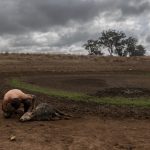 July 19, 2019 1:00 pm
Published by Climate Extremes
July 19, 2019 1:00 pm
Published by Climate Extremes
The primary goal of this project is to conduct an evaluation of the CMIP5 models for precipitation extremes over Australia. To that end, the student will assess how models simulate key precipitation metrics in comparison to observations.
 July 19, 2019 12:00 pm
Published by Climate Extremes
July 19, 2019 12:00 pm
Published by Climate Extremes
There is compelling evidence that under different climate states (e.g. glacial-interglacial cycles), the Atlantic Ocean has experienced significant water mass reorganisations and circulation changes. This project aims to better constrain these variations, using models able to simulate proxy variations.
 July 19, 2019 11:00 am
Published by Climate Extremes
July 19, 2019 11:00 am
Published by Climate Extremes
In this project we will look at one of the two following questions: Do marine heatwaves occur preferentially in certain seasons, and if so why? Do marine heatwaves produce a consistent response in ocean primary production?
 July 19, 2019 10:00 am
Published by Climate Extremes
July 19, 2019 10:00 am
Published by Climate Extremes
This project will quantify the impact of the front on air-sea exchange of heat and characterise how air-sea exchange and upper ocean properties change across the front.
 July 19, 2019 9:00 am
Published by Climate Extremes
July 19, 2019 9:00 am
Published by Climate Extremes
This project aims to discover where and when regional climate models improve (or not) on the simulation of Australian heatwaves, relative to their host global climate models.
 July 19, 2019 8:00 am
Published by Climate Extremes
July 19, 2019 8:00 am
Published by Climate Extremes
In this project, the student will learn more about the effects of the Millennium drought on the surface energy budget, particularly on the ratio of sensible heat flux to latent heat flux (i.e. SH/LH).
 July 19, 2019 7:00 am
Published by Climate Extremes
July 19, 2019 7:00 am
Published by Climate Extremes
This project will explore different methods of assessing cumulative exposure to air pollution in order to make suggestions as to how we might best make policy recommendations that protect the health of all Australians, including vulnerable communities.
 July 19, 2019 6:00 am
Published by Climate Extremes
July 19, 2019 6:00 am
Published by Climate Extremes
This student project will focus on spatially correlated events in Australia that occurred in the past 30 to 40 years. Using observations over this time period the student will catalogue past compound events; assess possible trends in their occurrence; check for preferred spatial correlation patterns; and assess if these were accurately reproduced in reanalysis products (e.g. BARRA, ERA-5 and/or ERA-Interim).
 July 19, 2019 5:00 am
Published by Climate Extremes
July 19, 2019 5:00 am
Published by Climate Extremes
This student project will determine the probability of a drought being terminated by an extreme precipitation event to assess the risk of drought-induced flooding. For this the student will assess observations, reanalysis data and results from a large climate model ensemble.
 July 19, 2019 3:00 am
Published by Climate Extremes
July 19, 2019 3:00 am
Published by Climate Extremes
The summer student on this project will make use of recent observations and combine these novel machine learning and image processing techniques to understand the drivers of recent ocean change.










